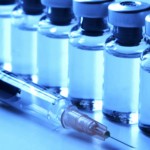 A new kind of so-called ‘reverse’ vaccine built to dial down the autoimmune reaction that causes type-1 diabetes is showing promise, a study of 80 patients given once-weekly injections of the vaccine for 12 weeks reveals
A new kind of so-called ‘reverse’ vaccine built to dial down the autoimmune reaction that causes type-1 diabetes is showing promise, a study of 80 patients given once-weekly injections of the vaccine for 12 weeks reveals
Results of an early-stage clinical trial of the vaccine, just reported in Science Translational Medicine, suggest that the vaccine may be able to slow or, at best, halt the destruction of the insulin-secreting pancreatic beta cells that are targeted by an errant immune system.
When I interviewed Stanford neuroimmunologist Larry Steinman, MD, for our news release on the trial, he told me: “We’re very excited by these results, which suggest that the immunologist’s dream of shutting down just a single subset of dysfunctional immune cells without wrecking the whole immune system may be attainable… This vaccine is a new concept. It’s shutting off a specific immune response, rather than turning on specific immune responses as conventional vaccines for, say, influenza or polio aim to do.”
Although there’s still a very, very long way to go before this novel therapy sees widespread use, it’s already exceptional in several ways.
When we hear the word “vaccine,” we ordinarily think of a shot people get to fire up their immune systems so that infectious organisms will be thwarted in their never-ending efforts to invade us all. Many of us also know a vaccine is typically composed of proteins – or bits of them, or groups of them – purified or derived from the particular pathogen that vaccine targets. These proteinaceous particles serve as “mug shots” that, presented properly to the immune system’s patrolling bloodhound cells, puts them in a snarling mood and greatly amps up both the speed and the volume of the immune response.
But the new vaccine a) is given after, not before, a person gets sick; b) targets not an invading pathogen but a disorder of internal origin; c) is intended to diminish, not enhance, the immune response; and d) is made not of proteins or components or combinations of them, but of DNA containing the gene that codes for a protein (in this case, a protein called proinsulin, which is the precursor to insulin).
That’s a lot of exceptions. Here’s just one more: Steinman is a world authority on multiple sclerosis, but his name isn’t usually associated with type 1 diabetes. Nor are those of rheumatologists P.J. Utz, MD, and Bill Robinson, MD. However, all three physicians are laser-focused on autoimmune disorders, for which type 1 diabetes – almost certainly caused by an inappropriate aggressive immune response aimed at the only cells in the body that make insulin – is a poster child.
Source: Scope

















